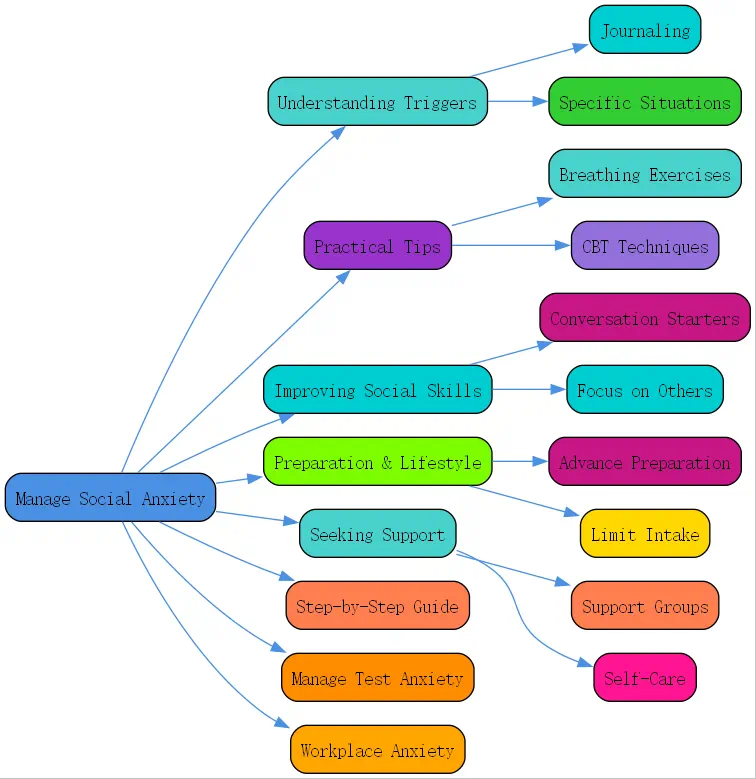Are you struggling with social anxiety? You’re not alone. Many people experience nervousness and discomfort in social situations, but there are effective strategies to manage these feelings. In this comprehensive guide, we’ll explore ten proven techniques to help you manage social anxiety, reduce stress, and build confidence in social interactions.
Understanding Social Anxiety and Its Triggers

The first step in learning to manage social anxiety is understanding what triggers it. Social anxiety can manifest in various ways, from mild nervousness to intense fear in social situations. By identifying your specific triggers, you can develop targeted strategies to cope with them effectively.

Keeping a Journal to Identify Anxiety Patterns
One of the most effective ways to understand your social anxiety is by keeping a journal. Record situations that cause anxiety, noting the time, place, and people involved. Also, jot down your physical and emotional reactions. Over time, you’ll start to see patterns emerge, which can be incredibly insightful.
For example, you might notice that you feel particularly anxious when meeting new people at work, but less so when interacting with friends of friends. This information can help you tailor your coping strategies to specific situations.
Recognizing Specific Situations That Cause Anxiety
As you journal, pay close attention to the specific situations that trigger your anxiety. Is it public speaking? Large group settings? One-on-one conversations with strangers? By pinpointing these scenarios, you can prepare yourself mentally and emotionally when you know you’ll be facing them.
The Importance of Knowing Your Triggers
Understanding your triggers is crucial because it allows you to anticipate and prepare for challenging situations. This knowledge empowers you to develop coping mechanisms tailored to your specific needs, making them more effective in managing your social anxiety.
Practical Tips to Manage Anxiety and Stress in Social Situations
Once you’ve identified your triggers, it’s time to explore practical strategies to manage social anxiety in the moment. These techniques can help you stay calm and composed when facing anxiety-inducing situations.
Deep Breathing Exercises for Immediate Calm
Deep breathing is a powerful tool for managing anxiety. When you’re feeling anxious, your breathing often becomes shallow and rapid. By consciously slowing and deepening your breath, you can activate your body’s relaxation response.
Try this simple technique: Inhale slowly through your nose for a count of four, hold for a count of four, then exhale through your mouth for a count of four. Repeat this cycle several times until you feel your anxiety start to subside.
Challenging Negative Thoughts: Cognitive Behavioral Techniques
Social anxiety often stems from negative thought patterns. Cognitive Behavioral Therapy (CBT) techniques can help you identify and challenge these thoughts. When you catch yourself thinking negatively, pause and ask:

- Is this thought based on facts or assumptions?
- What evidence do I have to support or refute this thought?
- How would I advise a friend thinking this way?
By questioning your negative thoughts, you can start to replace them with more balanced, realistic perspectives.
Gradual Exposure: Desensitizing Yourself to Social Situations
Gradual exposure is a powerful way to manage social anxiety. Start by creating a hierarchy of social situations, ranging from least to most anxiety-inducing. Begin with the least challenging scenario and gradually work your way up.
For instance, if large gatherings make you anxious, start by attending a small get-together with close friends. As you become more comfortable, slowly increase the size of the gatherings you attend. This step-by-step approach helps build confidence and reduces fear over time.
Improving Social Skills and Boosting Confidence
Enhancing your social skills can significantly reduce anxiety in social situations. As you become more confident in your ability to interact with others, you’ll likely find that your anxiety decreases.
Practicing Basic Conversation Starters and Active Listening
Prepare a few conversation starters before social events. These can be as simple as commenting on the venue, asking about someone’s weekend plans, or discussing current events. Remember, people generally enjoy talking about themselves, so asking open-ended questions can be a great way to keep a conversation flowing.
Active listening is equally important. Show genuine interest in what others are saying by maintaining eye contact, nodding, and asking follow-up questions. This not only helps the conversation flow but also takes the pressure off you to constantly come up with things to say.
Role-Playing Scenarios to Enhance Social Interaction
Practice makes perfect, and this applies to social interactions too. Role-play different social scenarios with a trusted friend or therapist. This can help you feel more prepared and confident when facing similar situations in real life.
For example, you could practice introducing yourself to a stranger or navigating a networking event. The more you practice, the more natural these interactions will feel.
Focusing on Others to Shift Attention Away from Anxiety
When you’re feeling anxious in social situations, it’s easy to become hyper-focused on your own discomfort. Try shifting your focus outward instead. Pay attention to the people around you, their body language, and what they’re saying. This not only distracts you from your anxiety but also helps you engage more naturally in the conversation.
Preparation and Lifestyle Adjustments for Social Anxiety
Managing social anxiety isn’t just about what you do in the moment; it also involves preparation and lifestyle changes that can reduce your overall anxiety levels.
Preparing in Advance for Social Events
When you know you’ll be facing a challenging social situation, preparation can help reduce anxiety. Research the event or venue, plan what you’ll wear, and think about potential conversation topics. Having a plan can help you feel more in control and less anxious.
Limiting Caffeine and Alcohol Intake
Both caffeine and alcohol can exacerbate anxiety symptoms. Caffeine is a stimulant that can increase heart rate and feelings of nervousness. While alcohol might seem like it helps in the short term, it can actually increase anxiety as it wears off.
Try to limit your intake of these substances, especially before social events. Instead, opt for calming herbal teas or water to stay hydrated without adding to your anxiety.
Prioritizing Sleep, Diet, and Physical Activity
A healthy lifestyle can have a significant impact on your ability to manage social anxiety. Ensure you’re getting enough sleep, as fatigue can worsen anxiety symptoms. Eat a balanced diet rich in whole foods, fruits, and vegetables. Regular physical activity, even just a daily walk, can help reduce stress and improve your mood.
Seeking Support and Self-Care for Managing Social Anxiety

Remember, you don’t have to face social anxiety alone. There are many sources of support available to help you on your journey.
The Value of Support Groups and Sharing Experiences
Joining a support group for people with social anxiety can be incredibly beneficial. Sharing your experiences with others who understand can provide comfort, validation, and practical advice. You might also learn new coping strategies from others in the group.
Professional Help: Therapy for Tailored Strategies
If social anxiety is significantly impacting your life, consider seeking help from a mental health professional. A therapist can provide personalized strategies tailored to your specific needs and challenges. They can also guide you through more intensive treatments like Cognitive Behavioral Therapy or Exposure Therapy.
Self-Care Routines: Meditation, Yoga, and Hobbies
Engaging in regular self-care activities can help reduce overall anxiety levels. Practices like meditation and yoga can help calm your mind and body. Pursuing hobbies you enjoy can boost your confidence and provide a sense of accomplishment outside of social situations.
Ways to Manage Social Anxiety: A Step-by-Step Guide
Managing social anxiety is a journey, and it’s important to have a clear plan of action. Here’s a step-by-step guide to help you navigate this process:
1. Identify your triggers through journaling and self-reflection. 2. Practice deep breathing exercises daily. 3. Challenge negative thoughts using CBT techniques. 4. Gradually expose yourself to anxiety-inducing situations. 5. Improve your social skills through practice and role-playing. 6. Prepare for social events in advance. 7. Make lifestyle adjustments to reduce overall anxiety. 8. Seek support from groups or professionals. 9. Engage in regular self-care activities. 10. Celebrate your progress, no matter how small.
Remember, progress may be gradual, but with consistent effort, you can significantly reduce the impact of social anxiety on your life.
Manage Test Anxiety: Specific Strategies for Academic Success
While we’ve focused primarily on social anxiety, many of these strategies can also be applied to manage test anxiety. Here are some specific tips for academic situations:
Preparing for Exams to Reduce Anxiety
Thorough preparation is key to reducing test anxiety. Create a study schedule, review past papers, and identify areas where you need more practice. The more prepared you feel, the less anxious you’re likely to be on test day.
Test-Taking Strategies to Minimize Anxiety
During the test, use deep breathing techniques to stay calm. Focus on one question at a time rather than worrying about the entire exam. Remember, it’s normal to feel some anxiety, but with these strategies, you can manage it effectively.
Q&A: How can I manage social anxiety in the workplace?
Managing social anxiety in the workplace can be challenging, but it’s definitely possible. Here are some strategies:
1. Prepare for meetings in advance, including reviewing agendas and preparing talking points. 2. Practice deep breathing before and during anxiety-inducing situations. 3. Challenge negative thoughts about your performance or others’ perceptions of you. 4. Gradually expose yourself to more social situations at work, starting with less intimidating ones. 5. Focus on your work tasks rather than your anxiety when possible. 6. Consider discussing your anxiety with a trusted supervisor or HR representative who may be able to provide accommodations or support.
Remember, many people experience workplace anxiety, and there’s no shame in seeking help or implementing strategies to manage it.




